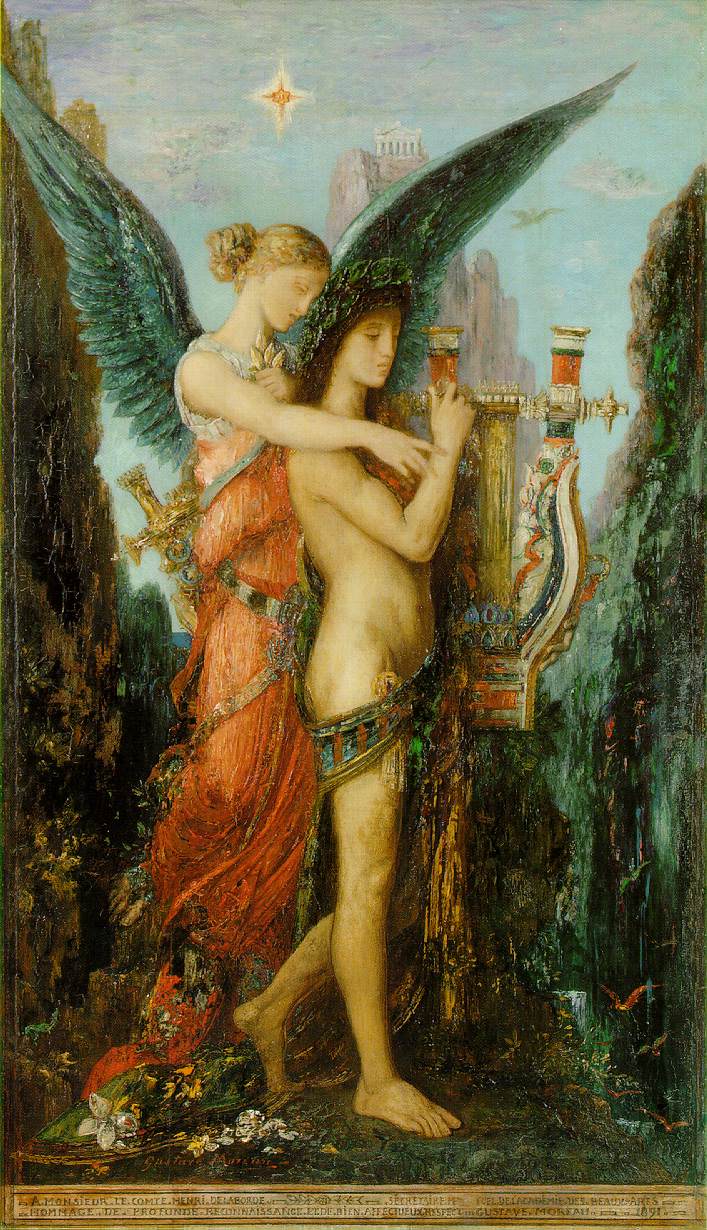„Mach keine schlechten Gewinne, sie sind so schlimm wie Verluste.“
Werke und Tage, 352
Original griech.: "μὴ κακὰ κερδαίνειν· κακὰ κέρδεα ἶσ᾽ ἀάτῃσιν."
Hesiod war ein griechischer Dichter, der als Ackerbauer und Viehhalter lebte. Hesiods Werke sind, neben der Ilias und Odyssee von Homer, die Hauptquellen für unser heutiges Wissen über die griechische Mythologie und Mythographie sowie das Alltagsleben seiner Zeit. Er gilt als Begründer des didaktischen Epos, des Lehrgedichtes, das nach seiner Heimat Askra später von den Römern, besonders von Vergil, als Ascraeum carmen bezeichnet wurde. Wikipedia

„Mach keine schlechten Gewinne, sie sind so schlimm wie Verluste.“
Werke und Tage, 352
Original griech.: "μὴ κακὰ κερδαίνειν· κακὰ κέρδεα ἶσ᾽ ἀάτῃσιν."
„Wer anderen schadet, schadet sich selbst.“
Werke und Tage, 265
Original griech.: "οἷ τ αὐτῷ κακὰ τεύχει ἀνὴρ ἄλλῳ κακὰ τεύχων·"
„Mehr ist die Hälfte als das Ganze.“
Werke und Tage, 40
Original griech.: "πλέον ἥμισυ παντός."
„Vor die Tugend haben die unsterblichen Götter den Schweiß gesetzt.“
Werke und Tage, 289f
Original griech.: "τῆς δ᾽ ἀρετῆς ἱδρῶτα θεοὶ προπάροιθεν ἔθηκαν ἀθάνατοι·"
„Arbeit schändet nicht, die Trägheit aber entehrt uns.“
Werke und Tage, 311
Original griech.: "ἔργον δ᾽ οὐδὲν ὄνειδος, ἀεργίη δέ τ᾽ ὄνειδος·"
„Denn ein schlechter Nachbar ist eine so große Plage, wie ein guter ein Segen ist.“
Werke und Tage, 346
Original griech.: "πῆμα κακὸς γείτων, ὅσσον τ᾽ ἀγαθὸς μέγ᾽ ὄνειαρ·"
„Denn im Unglück pflegen die Menschen früher zu altern.“
Werke und Tage, 93
Original griech.: "αἶψα γὰρ ἐν κακότητι βροτοὶ καταγηράσκουσιν·"
„Die Arbeitenden sind den Unsterblichen viel lieber.“
Werke und Tage, 309
Original griech.: "ἐργαζόμενοι πολὺ φίλτεροι ἀθανάτοισιν·"
Hesiod, Theogonie 907 ff, auch sprichwörtlich
Original griech.: " Τρεῖς δέ οἱ Εὐρυνόμη Χάριτας ..."
„Erstlich des Hauses und des Weibes und des pflügenden Ochsen bedarf man.“
Werke und Tage, 405
Original griech.: "οἶκον μὲν πρώτιστα γυναῖκά τε βοῦν τ᾽ ἀροτῆρα·"
„Mach einen Freund nicht einem Bruder gleich, doch wenn, tu ihm als Erster nicht ein Unrecht an.“
Werke und Tage, 707f
Original griech.: "μηδὲ κασιγνήτῳ ἶσον ποιεῖσθαι ἑταῖρον· εἰ δέ κε ποιήσηις, μή μιν πρότερος κακὸν ἔρξῃς."
„Mäßigung übe nur stets; denn Maß ist von allem das Beste.“
Werke und Tage, 694
Original griech.: "μέτρα φυλάσσεσθαι· καιρὸς δ᾽ ἐπὶ πᾶσιν ἄριστος."
„Oft schon musste eine ganze Stadt für die Übeltaten eines einzigen Mannes büßen.“
Werke und Tage, 240
Original griech.: "πολλάκι καὶ ξύμπασα πόλις κακοῦ ἀνδρὸς ἀπηύρα."
„Wer dem Weibe vertraut, der vertraut auch Dieben.“
Werke und Tage, 375
Original griech.: "ὃς δὲ γυναικὶ πέποιθε, πέποιθ᾽ ὅ γε φηλήτῃσιν·"
“Observe due measure, for right timing is in all things the most important factor.”
Quelle: Works and Days (c. 700 BC), line 694.
“It is not possible to deceive or go beyond the will of Zeus.”
Quelle: The Theogony (c. 700 BC), line 613.
“He harms himself who does harm to another, and the evil plan is most harmful to the planner.”
οἷ γ᾽ αὐτῷ κακὰ τεύχει ἀνὴρ ἄλλῳ κακὰ τεύχων
ἡ δὲ κακὴ βουλὴ τῷ βουλεύσαντι κακίστη.
The man who does evil to another does evil to himself, and the evil counsel is most evil for him who counsels it.
He for himself weaves woe who weaves for others woe,
and evil counsel recoils on the counsellor. https://archive.org/stream/b24865898#page/432/mode/2up
Quelle: Works and Days (c. 700 BC), lines 265-266
“Sometimes a day is a step mother, sometimes a mother.”
Quelle: Works and Days (c. 700 BC), line 825.
“Work is no disgrace: it is idleness which is a disgrace.”
Quelle: Works and Days (c. 700 BC), line 311.
“The dawn speeds a man on his journey, and speeds him too in his work.”
Quelle: Works and Days (c. 700 BC), line 579.
“Invite the man that loves thee to a feast, but let alone thine enemy.”
Quelle: Works and Days (c. 700 BC), line 342.
“Wealth should not be seized: god-given wealth is much better.”
Quelle: Works and Days (c. 700 BC), line 320.
This quote has been attributed to Hesiod on the internet, and even published with citation as a dubious attribution, but there are no known occurrences of it in his writings.
Misattributed
“For a man wins nothing better than a good wife, and, again, nothing worse than a bad one.”
Quelle: Works and Days (c. 700 BC), line 702.
Quelle: The Theogony (c. 700 BC), line 603.
“For trust and mistrust, alike ruin men.”
Quelle: Works and Days (c. 700 BC), line 372.
“The gods have placed sweat as the price of all things.”
Perhaps a mistranslation of line 289 of Works and Days, actually:
: But in front of excellence the immortal gods have put sweat
Misattributed
“Fools, they do not even know how much more is the half than the whole.”
Quelle: Works and Days (c. 700 BC), line 40; often translated as "The half is greater than the whole."
“Diligence increaseth the fruit of toil. A dilatory man wrestles with losses.”
Quelle: Works and Days (c. 700 BC), line 412.
“Do not seek evil gains; evil gains are the equivalent of disaster.”
Gain not base gains; base gains are the same as losses.
Quelle: Works and Days (c. 700 BC), line 352; compare: "the gains of the wicked bring trouble", Book of Proverbs 15:6.
We know to tell many fictions like to truths, and we know, when we will, to speak what is true.
We know how to tell many lies that pass for truth, and we know, when we wish, to tell the truth itself.
Quelle: The Theogony (c. 700 BC), lines 27–28. Variant translations:
“On the tongue of such an one they shed a honeyed dew, and from his lips drop gentle words.”
Quelle: The Theogony (c. 700 BC), line 82.
